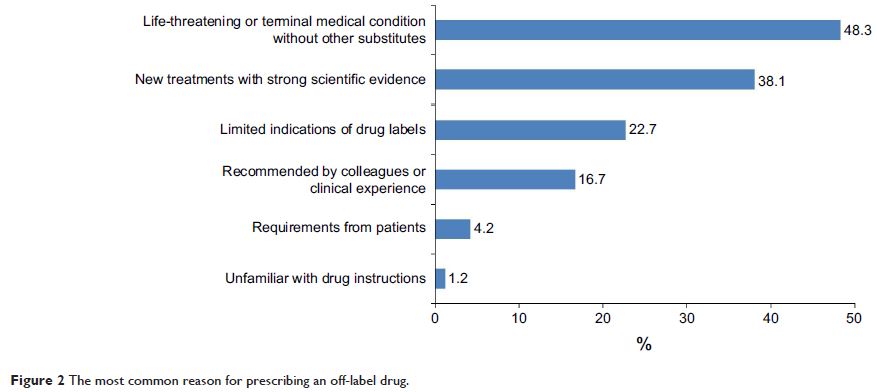108985
论文已发表
注册即可获取德孚的最新动态
IF 收录期刊
- 3.4 Breast Cancer (Dove Med Press)
- 3.2 Clin Epidemiol
- 2.6 Cancer Manag Res
- 2.9 Infect Drug Resist
- 3.7 Clin Interv Aging
- 5.1 Drug Des Dev Ther
- 3.1 Int J Chronic Obstr
- 6.6 Int J Nanomed
- 2.6 Int J Women's Health
- 2.9 Neuropsych Dis Treat
- 2.8 OncoTargets Ther
- 2.0 Patient Prefer Adher
- 2.2 Ther Clin Risk Manag
- 2.5 J Pain Res
- 3.0 Diabet Metab Synd Ob
- 3.2 Psychol Res Behav Ma
- 3.4 Nat Sci Sleep
- 1.8 Pharmgenomics Pers Med
- 2.0 Risk Manag Healthc Policy
- 4.1 J Inflamm Res
- 2.0 Int J Gen Med
- 3.4 J Hepatocell Carcinoma
- 3.0 J Asthma Allergy
- 2.2 Clin Cosmet Investig Dermatol
- 2.4 J Multidiscip Healthc

重症监护室的核准标示外用途处方:中国的经验
Authors Liu L, Yang H, Lou Y, Miao J, Lu X, Zhao Q, Wang R, Jiang S, Zhang X
Received 14 July 2017
Accepted for publication 21 November 2017
Published 31 January 2018 Volume 2018:14 Pages 195—202
DOI https://doi.org/10.2147/TCRM.S146425
Checked for plagiarism Yes
Review by Single-blind
Peer reviewers approved by Dr Hoa Le
Peer reviewer comments 2
Editor who approved publication: Professor Deyun Wang
Background and
purpose: Off-label prescriptions for
critically ill patients pose several ethical and legal dilemmas for intensive
care unit (ICU) clinicians. Yet, few data are available on the prevalence of
this practice in critical care environment in China. This nationwide survey was
performed to evaluate the conditions of off-label prescriptions in ICU within
China.
Methods: The survey was performed at the scene of the
national ICU conferences in 2016. ICU clinicians attending the congress from 23
provinces across the country were invited. The features of the clinician’s
off-label prescription practice were investigated and analyzed.
Results: A total of 1,318 ICU clinicians completed the
anonymous questionnaire. Of these, 76.2% prescribed off-label in clinical
practice. A significant difference (p <0.005) was
observed between the ICU clinicians with different years of working experience
and professional levels, respectively. For 69.2% of the ICU clinicians, the
proportion of off-label prescriptions did not exceed 10%, while for fewer
prescribers (2.9%), the proportion exceeded 25%. The main reasons for off-label
prescriptions were life-threatening or terminal medical condition without other
substitutes (48.3%), new treatments with strong scientific evidence (38.1%),
and limited indications of drug labels (22.7%). Of the ICU clinicians surveyed,
87.5% worried about causing medical disputes, and 26.5% encountered medical
disputes caused by off-label prescriptions. The risk of medical disputes was
positively associated with the proportion of off-label prescriptions (p =0.009). Among the ICU
clinicians, 92.5% expected the national policy for off-label prescriptions in
future. Gastrointestinal and respiratory drug classes were noted to have the
highest prevalence of off-label use.
Conclusion: Off-label prescriptions have been commonly practiced
by ICU clinicians in China. A concerted effort should be made to develop a
practical and explicit guidance for off-label prescriptions.
Keywords: off-label
prescriptions, intensive care unit, questionnaire, Chinese hospitals
